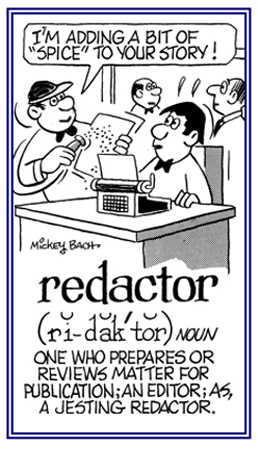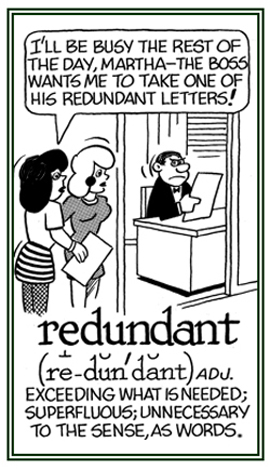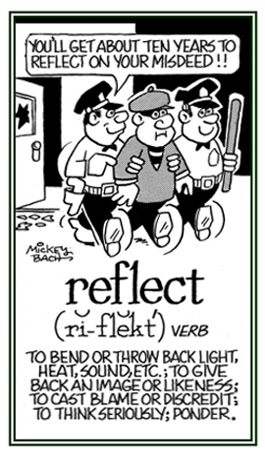re-, red-
(Latin: back, backward, again; used as a prefix)
1. Someone who edits text in order to get it ready for publication: Geraldine, a newspaper reporter, has a redactor who makes a daily examination of her articles before they are printed for the public to read.
2. A person who censors or obscures part of a written document for legal or security reasons: There are some redactors who have the responsibilities of making sure that the contents of certain government publications are legally safe to reveal to unofficial viewers.
3. Etymology: from Latin redactio from redigere, "to bring back, to drive back" from re-, "back, again" + -agere, "to drive."

© ALL rights are reserved.
Go to this Word A Day Revisited Index
2. A person who censors or obscures part of a written document for legal or security reasons: There are some redactors who have the responsibilities of making sure that the contents of certain government publications are legally safe to reveal to unofficial viewers.
3. Etymology: from Latin redactio from redigere, "to bring back, to drive back" from re-, "back, again" + -agere, "to drive."

Go to this Word A Day Revisited Index
so you can see more of Mickey Bach's cartoons.
rededicate (ri DED i kayt") (verb), rededicates; rededicated; rededicating
1. To set something apart for a particular purpose again: A TV program was rededicated to the study of cats and their special relationships with people.
2. To commit one's life to achieving special objectives over and over: Doris rededicates her life everyday to provide a better understanding of vocabulary entries so more words can be comprehended by users; especially, students who fail to find such information available in most dictionaries.
2. To commit one's life to achieving special objectives over and over: Doris rededicates her life everyday to provide a better understanding of vocabulary entries so more words can be comprehended by users; especially, students who fail to find such information available in most dictionaries.
1. A condition or quality of having a pleasant or a fragrant smell: The flowers that Jill brought home have a redolence which is greatly enjoyed by her and her family.
2. Etymology: from Latin redolentem, "emitting a scent"; from re-, red- ,"back" + olere, "to smell".

© ALL rights are reserved.
Go to this Word A Day Revisited Index
2. Etymology: from Latin redolentem, "emitting a scent"; from re-, red- ,"back" + olere, "to smell".

Go to this Word A Day Revisited Index
so you can see more of Mickey Bach's cartoons.
reduce
1. To bring down, diminish to a smaller number, amount, extent, etc., or to a single thing: "The store reduced the coat from $100 to $65."
2. In chemistry, to decompose (a compound); to resolve into a simpler compound or into the constituent element; minimize, dilute, moderate: "Water reduces the potency of an alcoholic drink."
3. To decrease one's weight, to slim down to a lower weight: "It's easier to reduce if we simply watch what we eat."
2. In chemistry, to decompose (a compound); to resolve into a simpler compound or into the constituent element; minimize, dilute, moderate: "Water reduces the potency of an alcoholic drink."
3. To decrease one's weight, to slim down to a lower weight: "It's easier to reduce if we simply watch what we eat."
reduction
1. The act or process of bringing something down in extent, amount, or degree; diminish.
2. The action or process of making a copy on a smaller scale.
2. The action or process of making a copy on a smaller scale.
1. The state or fact of not, or no longer, being needed or wanted.
2. Something that is not or no longer needed nor wanted.
3. The use of a word, or words, whose meaning is already conveyed elsewhere in a passage, without a rhetorical purpose; excessive wordiness, or repetition, when expressing oneself.
4. With computers, the installation of duplicate electronic, mechanical components, or backup systems that are designed to come into use to keep equipment working if their counterparts fail.
5. Duplication of information in telecommunications to reduce the risk of errors.
6. In Britain and Canada, a dismissal from work, or employment (unemployed), because the job or the worker has been deemed no longer necessary: After being declared redundant, Ivan was told that his services were no longer necessary; so, now he is in a status of redundancy.
2. Something that is not or no longer needed nor wanted.
3. The use of a word, or words, whose meaning is already conveyed elsewhere in a passage, without a rhetorical purpose; excessive wordiness, or repetition, when expressing oneself.
4. With computers, the installation of duplicate electronic, mechanical components, or backup systems that are designed to come into use to keep equipment working if their counterparts fail.
5. Duplication of information in telecommunications to reduce the risk of errors.
6. In Britain and Canada, a dismissal from work, or employment (unemployed), because the job or the worker has been deemed no longer necessary: After being declared redundant, Ivan was told that his services were no longer necessary; so, now he is in a status of redundancy.
redundant (adjective), more redundant, most redundant
1. Pertaining to the use of more words than are necessary to express an idea: The mayor's speech was considered to be the most redundant one that the citizens had ever heard; including, promises, promises, and more promises.
2. Referring to the repetition of words with the same meanings as others which are used several times in a presentation: In her speech, the politician became even more redundant than usual, saying: "and I repeat" and "I tell you again".
3. Descriptive of something which is beyond what is necessary or natural; superfluous: Serving chocolate ice cream with the chocolate cake, which was covered with chocolate icing, seemed quite redundant.

© ALL rights are reserved.
Go to this Word A Day Revisited Index
2. Referring to the repetition of words with the same meanings as others which are used several times in a presentation: In her speech, the politician became even more redundant than usual, saying: "and I repeat" and "I tell you again".
3. Descriptive of something which is beyond what is necessary or natural; superfluous: Serving chocolate ice cream with the chocolate cake, which was covered with chocolate icing, seemed quite redundant.

Go to this Word A Day Revisited Index
so you can see more of Mickey Bach's cartoons.
reduplicate (ri DOO pluh kayt", ri DYOO pluh kayt") (verb), reduplicates; reduplicated; reduplicating
1. To repeat or to double something again: There are some words that reduplicate vowels, syllables, or words in order to create new words or linguistic elements; for example, the following words have parts that are reduplicated: "wishy-washy" and "goody-goody".
The phrase in a music composition is repeated or reduplicated quite often and the listener can usually recognize it each time.
2. To reproduce an element of a word precisely or with a small change: Monika reduplicated some linguistic elements of words to make her short story more interesting and expressive; for example, teeny-weeny, see-saw, and chitchat. 3. To make identical copies of the same thing that has been done previously: The writer of the short autobiography had the printer reduplicate his composition because more people wanted copies than he had anticipated.
re-echo
referable (adjective), more referable, most referable
Characteristic of being assigned to or regarded as belonging to a particular situation or cause: The collapse of the wall of Hardy's barn was a referable accident as a result of the heavy rains during the spring.
1. An individual or an institution which is able to provide information about someone in order to support the activity of that person: Mark's favorite history professor, Dr. Charles, agreed to be a reference for him when he applied for a grant to proceed with his PhD or Doctor of Philosophy in psychology.
2. An indication or note in a publication recommending the reader to look for further information in a different source: The reference in the text directed Allen to see the on-line dictionary for details about the etymology of words.
2. An indication or note in a publication recommending the reader to look for further information in a different source: The reference in the text directed Allen to see the on-line dictionary for details about the etymology of words.
reflect (verb), reflects; reflected; reflecting
1. To cast back light, heat, sound, etc. from a surface: The mirror reflected the light onto the wall.
2. To reproduce; to show: Hank's followers are reflecting his views regarding what to do in the financial conditions that exist at the present time.
3. To throw or to cast back; to cause to return or rebound: Sara's bitterness regarding her recent divorce reflects gloom on all of her family.
4. To give evidence of a person's quality or character; to show proof of a feature or attribute of something: The grade Ingrid got on her final examination in her history class reflects well on her abilities.
5. Etymology: from Latin reflectere, "to bend back" from re-, "back" + flectere, "to bend".

© ALL rights are reserved.
Go to this Word A Day Revisited Index
2. To reproduce; to show: Hank's followers are reflecting his views regarding what to do in the financial conditions that exist at the present time.
3. To throw or to cast back; to cause to return or rebound: Sara's bitterness regarding her recent divorce reflects gloom on all of her family.
4. To give evidence of a person's quality or character; to show proof of a feature or attribute of something: The grade Ingrid got on her final examination in her history class reflects well on her abilities.
5. Etymology: from Latin reflectere, "to bend back" from re-, "back" + flectere, "to bend".

Go to this Word A Day Revisited Index
so you can see more of Mickey Bach's cartoons.
reflection, reflexion
1. The image of something as reflected by a mirror (or other reflective material).
2. A fixing of thoughts on something; careful consideration.
3. A thought occurring in consideration or meditation.
4. An unfavorable remark or observation.
5. The return of light, heat, sound, etc., after striking a surface.
6. In anatomy, the bending or folding back of a part upon itself.
2. A fixing of thoughts on something; careful consideration.
3. A thought occurring in consideration or meditation.
4. An unfavorable remark or observation.
5. The return of light, heat, sound, etc., after striking a surface.
6. In anatomy, the bending or folding back of a part upon itself.
reflex
1. An automatic instinctive unlearned reaction to a stimulus.
2. Noting or pertaining to an involuntary response to a stimulus, the nerve impulse from a receptor being transmitted inward to a nerve center that in turn transmits it outward to an effector.
3. Occurring in reaction; responsive.
4. Cast back; reflected, as light, color, etc.
5. Bent or turned back.
6. Designating a radio apparatus in which the same circuit or part performs two functions.
2. Noting or pertaining to an involuntary response to a stimulus, the nerve impulse from a receptor being transmitted inward to a nerve center that in turn transmits it outward to an effector.
3. Occurring in reaction; responsive.
4. Cast back; reflected, as light, color, etc.
5. Bent or turned back.
6. Designating a radio apparatus in which the same circuit or part performs two functions.
reflexive
1. Describes a pronoun referring to the same person or thing as another noun or pronoun in the same sentence. The reflexive pronouns in English end in "-self" or "-selves," e.g. "myself," "yourself," "ourselves."
2. Describes a verb that takes a reflexive pronoun as an object, thereby indicating an action that the subject does to or for itself: "He admired himself".
3. Relating to or being the product of a reflex;such as, "a reflexive action in response to the explosive sound."
4. Without thinking; an automatic and involuntary or unthinking.
5. Describes a relation between pairs of logical objects or numbers that are the same or of the same size.
2. Describes a verb that takes a reflexive pronoun as an object, thereby indicating an action that the subject does to or for itself: "He admired himself".
3. Relating to or being the product of a reflex;such as, "a reflexive action in response to the explosive sound."
4. Without thinking; an automatic and involuntary or unthinking.
5. Describes a relation between pairs of logical objects or numbers that are the same or of the same size.


